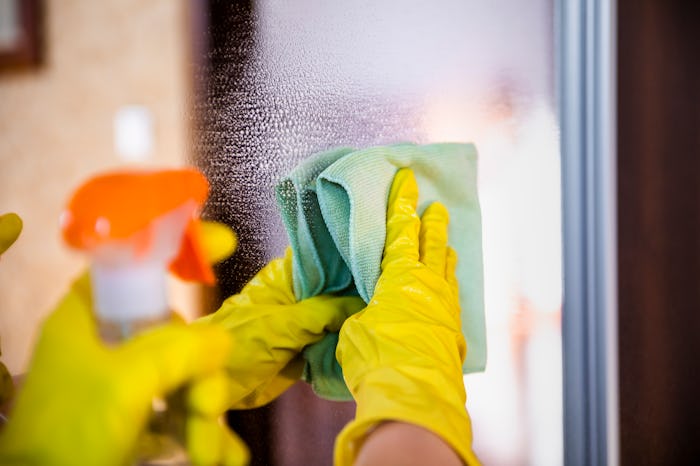News

EPA Weighs In On Which Disinfectant Sprays Can Effectively Kill COVID-19 On Surfaces
For the first time during the COVID-19 pandemic, the Environmental Protection Agency (EPA) has issued its approval on two disinfectant sprays that can effectively kill the coronavirus when used on hard, non-porous surfaces. On Monday, the EPA announced that laboratory tests concluded two Lysol products — Lysol Disinfectant Spray and Lysol Max Cover Disinfectant Mist — are "effective against SARS-CoV-2."
"EPA is committed to identifying new tools and providing accurate up-to-date information to help the American public protect themselves and their families from the novel coronavirus," EPA Administrator Andrew Wheeler said in a statement. "EPA's review of products tested against this virus marks an important milestone in President Trump's all of government approach to fighting the spread of COVID-19."
The coronavirus can live on surfaces anywhere between a few hours to a few days, according to the Centers for Disease Control and Prevention (CDC). Therefore, the CDC recommends regularly cleaning and disinfecting visibly dirty surfaces in your home as an added measure to protect yourself and others from COVID-19. According to the federal agency, high-touch surfaces — like door knobs, tables, light switches, and phones — should be disinfected daily.
Disinfectants approved by the EPA to kill the coronavirus must demonstrate efficacy against a virus that is harder to kill than the coronavirus, demonstrate efficacy against another virus similar to the coronavirus, and demonstrate efficacy against the coronavirus itself.
"The EPA's approval recognizes that using Lysol Disinfectant Spray can help to prevent the spread of COVID-19 on hard, non-porous surfaces," Rahul Kadyan, executive vice president of hygiene for Lysol's parent company Reckitt Benckiser, told USA Today.
According to the EPA's report, the two Lysol products can kill the virus that causes COVID-19 in two minutes.
Even before the EPA's official approval, disinfectant sprays, including Lysol, flew off of store shelves. Back in April, Lysol's parent manufacturer said the company has been trying to keep up with the "unprecedented and accelerated" demand. "This demand is clearly having an impact on our retailers' inventory levels," the company told USA Today in April.
Lysol also tweeted about the shortage in April, asking people to avoid stockpiling the cleaning supplies and to only buy what they need. "Stock on shelves will vary day by day and it may be helpful to ask your retailer when they will be receiving their next shipments," Lysol wrote. "We also ask that consumers purchase only what they need so everyone can work together to stop the spread."
On Wednesday, the number of coronavirus cases in the United States surged to over 3 million, a startling number that's expected to grow. Wiping down the surfaces in your home is one of many ways you can help protect yourself and others from spreading the virus. The CDC also recommends washing your hands often, maintaining six feet apart from others, and wearing a mask when you're in public spaces.
If you think you’re showing symptoms of coronavirus, which include fever, shortness of breath, and cough, call your doctor before going to get tested. If you’re anxious about the virus’s spread in your community, visit the CDC for up-to-date information and resources, or seek out mental health support. You can find all of Romper’s parents + coronavirus coverage here.